30+ Mediterranean Breakfast Ideas
Ready to transform your breakfast routine?
Let’s explore over 30 delicious Mediterranean breakfast ideas that’ll transport you to sun-soaked coastlines and bustling markets.
From savory egg dishes to sweet pastries, there’s something here for every palate.
Buckle up for a culinary journey that’ll make your taste buds dance and your mornings brighter!
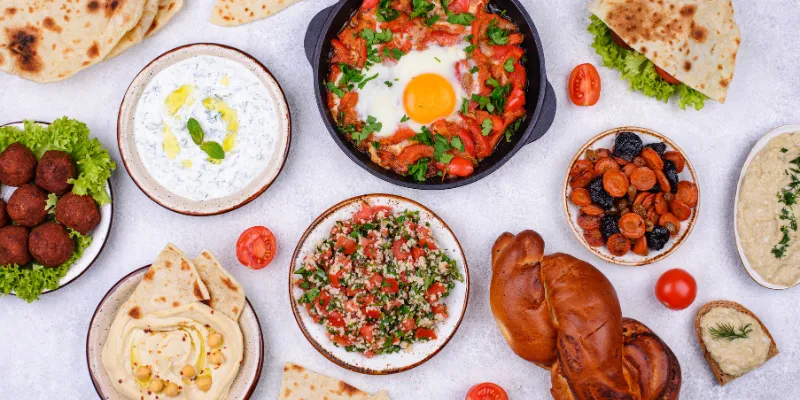
Egg Dishes
Shakshuka
Shakshuka is a vibrant North African dish that’s taken the breakfast world by storm.
Imagine eggs poached in a rich, spicy tomato sauce—it’s a flavor explosion in every bite!
To make shakshuka, you’ll simmer tomatoes, bell peppers, onions, and garlic with spices like cumin and paprika.
Then, crack eggs right into the sauce and let them cook to perfection. Serve it straight from the pan with crusty bread for dipping.
Nutrition info: One serving of shakshuka (2 eggs) contains approximately 220 calories, 14g protein, 11g fat, and 16g carbohydrates.
Turkish Menemen
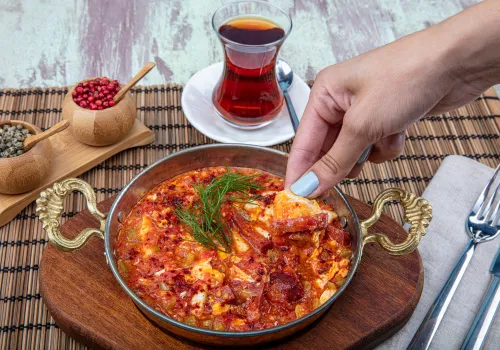
Menemen is like shakshuka’s laid-back cousin.
This Turkish classic features scrambled eggs cooked with tomatoes, peppers, and onions. It’s comfort food at its finest!
You’ll start by sautéing vegetables until they’re soft and fragrant. Then, pour in beaten eggs and gently scramble everything together.
The result? A hearty, satisfying breakfast that’ll keep you full for hours.
Nutrition info: A serving of menemen (1 cup) provides about 180 calories, 10g protein, 13g fat, and 8g carbohydrates.
Greek Omelet with Feta and Spinach
This isn’t your average omelet! The Greek version is packed with Mediterranean flavors that’ll transport you straight to the Aegean Sea.
To make it, you’ll fold a fluffy omelet around a filling of tangy feta cheese and nutrient-rich spinach.
Top it off with a sprinkle of oregano for an extra burst of Greek flavor. It’s a protein-packed way to start your day!
Nutrition info: One Greek omelet contains approximately 300 calories, 22g protein, 23g fat, and 4g carbohydrates.
Frittata with Mediterranean Vegetables
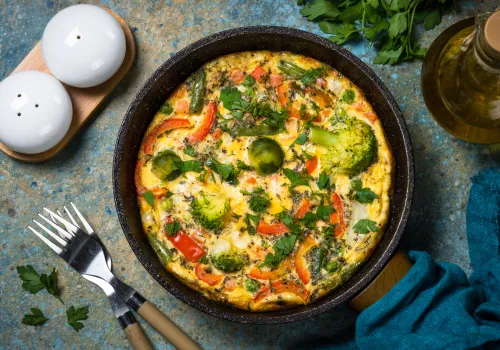
A frittata is like a crustless quiche—and this Mediterranean version is bursting with colorful veggies and herbs.
It’s perfect for feeding a crowd or meal prepping for the week ahead.
You’ll mix beaten eggs with roasted vegetables like zucchini, tomatoes, and bell peppers.
Add some crumbled feta cheese and fresh basil, then bake until golden. Slice it up and enjoy hot or cold!
Nutrition info: A slice of Mediterranean vegetable frittata (1/6 of a 10-inch frittata) has about 200 calories, 14g protein, 15g fat, and 6g carbohydrates.
Egg and Tomato Breakfast Scramble
This simple scramble is a quick and easy way to enjoy Mediterranean flavors in the morning.
It’s perfect for those busy weekdays when you need a nutritious breakfast in a hurry.
Scramble eggs with diced fresh tomatoes, a sprinkle of oregano, and a handful of crumbled feta cheese.
Serve it with a side of whole grain toast for a balanced meal that’ll keep you energized all morning.
Nutrition info: One serving of egg and tomato scramble (2 eggs) provides approximately 240 calories, 18g protein, 18g fat, and 4g carbohydrates.
Breads and Pastries

Simit (Turkish Sesame Bagel)
Simit is a ring-shaped bread that’s a staple of Turkish street food. It’s like a bagel, but with a unique texture and flavor that sets it apart.
These golden rounds are coated in sesame seeds and have a slightly crunchy exterior with a soft, chewy interior. ‘
Enjoy them plain, or split and spread with cheese or jam for a more substantial breakfast.
Nutrition info: One simit (about 100g) contains approximately 250 calories, 8g protein, 5g fat, and 45g carbohydrates.
Greek Spanakopita (Spinach Pie)
Spanakopita is a savory pastry that’s as fun to say as it is to eat! It’s made with layers of flaky phyllo dough filled with spinach and feta cheese.
The combination of crispy pastry and creamy, tangy filling makes for a delightful breakfast treat.
While it’s traditionally served as an appetizer, a slice of spanakopita makes for a satisfying morning meal.
Nutrition info: A piece of spanakopita (about 100g) provides roughly 180 calories, 6g protein, 12g fat, and 14g carbohydrates.
Za’atar Manakish (Lebanese Flatbread)
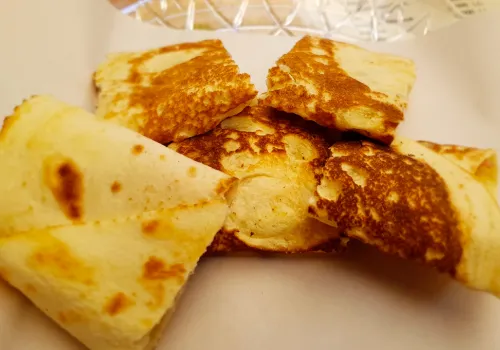
Manakish is a Lebanese flatbread that’s often enjoyed for breakfast.
It’s topped with za’atar, a Middle Eastern spice blend made from dried herbs, sesame seeds, and sumac.
The bread is typically made from a simple dough that’s stretched thin and baked until crispy.
The za’atar topping adds a burst of herby, tangy flavor that’s irresistible. It’s perfect for grabbing on the go!
Nutrition info: One piece of za’atar manakish (about 100g) contains approximately 250 calories, 7g protein, 9g fat, and 38g carbohydrates.
Bougatsa (Greek Custard Pie)
If you have a sweet tooth, bougatsa is the breakfast for you! This Greek pastry features layers of flaky phyllo dough filled with a creamy semolina custard.
Bougatsa is typically served warm, dusted with powdered sugar and cinnamon.
It’s a indulgent treat that pairs perfectly with a strong cup of coffee for a true Greek breakfast experience.
Nutrition info: A slice of bougatsa (about 100g) provides roughly 300 calories, 6g protein, 14g fat, and 40g carbohydrates.
Moroccan Msemen (Square Flatbread)
Msemen are flaky, layered flatbreads that are a popular breakfast food in Morocco.
They’re sometimes called “Moroccan pancakes,” but they’re more like a cross between a pancake and a pastry.
These square-shaped breads are made by folding and re-folding dough to create multiple layers.
They’re then cooked on a griddle until golden and crispy. Enjoy them plain, or spread with honey or jam for a sweet start to your day.
Nutrition info: One msemen (about 50g) contains approximately 150 calories, 3g protein, 7g fat, and 20g carbohydrates.
Dairy and Cheese
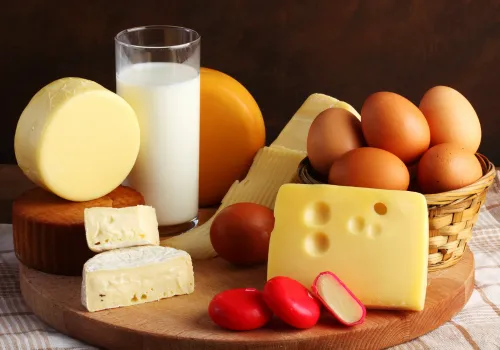
Labneh with Olive Oil and Za’atar
Labneh is a creamy, tangy cheese made from strained yogurt. It’s a staple in many Middle Eastern countries and makes for a delicious, protein-rich breakfast.
To serve, spread labneh on a plate, drizzle with high-quality olive oil, and sprinkle with za’atar spice blend.
Scoop it up with warm pita bread for a simple yet satisfying meal.
Nutrition info: A serving of labneh (about 100g) with olive oil and za’atar provides approximately 200 calories, 10g protein, 16g fat, and 6g carbohydrates.
Greek Yogurt with Honey and Nuts
Greek yogurt is a protein powerhouse that’s become popular worldwide.
In Greece, it’s often enjoyed for breakfast with a drizzle of honey and a sprinkle of nuts.
The thick, creamy texture of Greek yogurt pairs perfectly with the sweetness of honey and the crunch of nuts.
Choose walnuts or almonds for an extra boost of healthy fats and protein.
Nutrition info: A serving of Greek yogurt (200g) with honey (1 tbsp) and nuts (1 oz) contains about 300 calories, 20g protein, 14g fat, and 30g carbohydrates.
Feta Cheese Plate
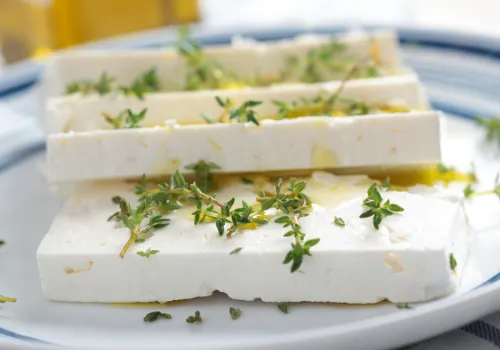
A feta cheese plate is a simple yet delicious way to start your day the Mediterranean way.
Feta is a brined cheese traditionally made from sheep’s milk or a mixture of sheep and goat’s milk.
Arrange slices of feta on a plate with some fresh tomatoes, cucumbers, and olives. Drizzle with olive oil and sprinkle with oregano. Serve with bread or pita for a well-rounded breakfast.
Nutrition info: A serving of feta cheese (50g) with vegetables and olive oil provides approximately 200 calories, 10g protein, 16g fat, and 5g carbohydrates.
Halloumi Cheese Grill
Halloumi is a semi-hard cheese from Cyprus that has a high melting point, making it perfect for grilling. It’s a unique and delicious addition to your breakfast repertoire.
Grill slices of halloumi until golden brown and slightly crispy on the outside. Serve with a drizzle of honey or a side of fresh fruit for a sweet-and-salty breakfast treat.
Nutrition info: A serving of grilled halloumi (100g) contains approximately 300 calories, 22g protein, 23g fat, and 2g carbohydrates.
Tzatziki Dip with Vegetables
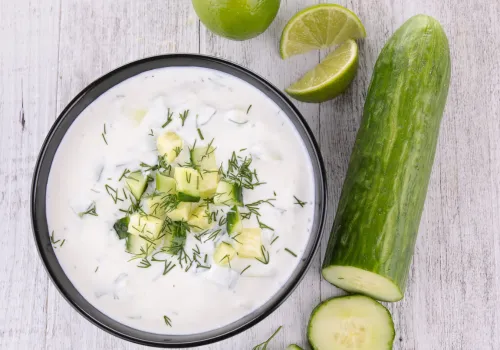
While tzatziki is often served as a sauce or dip with dinner, it also makes for a refreshing breakfast option. This yogurt-based dip is flavored with cucumber, garlic, and herbs.
Serve a bowl of tzatziki with an assortment of fresh vegetables for dipping.
Carrots, bell peppers, and cucumber sticks all work well. It’s a light, cool breakfast that’s perfect for warm Mediterranean mornings.
Nutrition info: A serving of tzatziki (100g) with assorted vegetables (100g) provides about 100 calories, 5g protein, 6g fat, and 8g carbohydrates.
Vegetable Dishes
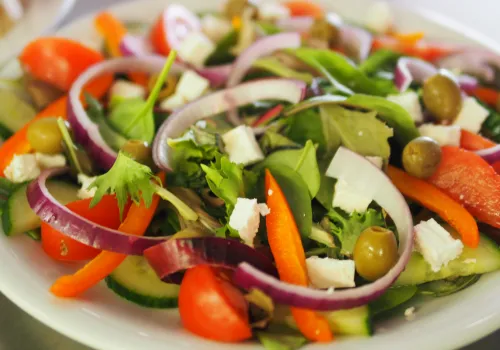
Israeli Salad
Israeli salad is a fresh, vibrant dish that’s often eaten for breakfast in Israel. It’s a simple mix of diced tomatoes, cucumbers, and onions, but it packs a flavorful punch.
The vegetables are chopped very finely and dressed with lemon juice, olive oil, and a sprinkle of salt.
Some variations include bell peppers, parsley, or mint. It’s a light, refreshing way to start your day!
Nutrition info: A serving of Israeli salad (1 cup) contains approximately 90 calories, 2g protein, 7g fat, and 8g carbohydrates.
Tabbouleh
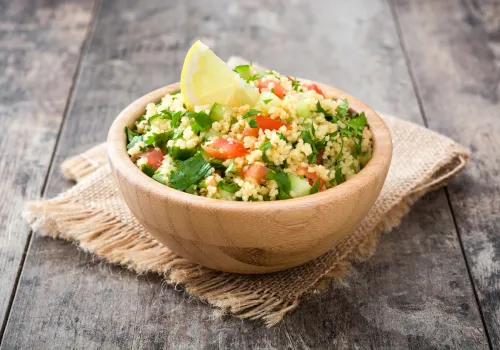
Tabbouleh is a Lebanese herb salad that’s bursting with fresh flavors. While it’s often served as a side dish, it makes for a light and nutritious breakfast too.
This salad is made with finely chopped parsley, tomatoes, onion, and bulgur wheat.
It’s dressed with lemon juice and olive oil for a zesty, refreshing taste. Tabbouleh is packed with vitamins and fiber to kickstart your day.
Nutrition info: A serving of tabbouleh (1 cup) provides about 150 calories, 4g protein, 8g fat, and 20g carbohydrates.
Grilled Eggplant with Tahini
Grilled eggplant with tahini sauce is a simple yet flavorful dish that’s popular throughout the Middle East.
It’s a great option for those who prefer a savory breakfast.
Slice eggplant, grill until tender, and top with a drizzle of tahini sauce (made from sesame paste, lemon juice, and garlic).
Sprinkle with fresh parsley and a dash of paprika for extra flavor.
Nutrition info: A serving of grilled eggplant (1 medium) with tahini sauce (2 tbsp) contains approximately 200 calories, 5g protein, 14g fat, and 20g carbohydrates.
Stuffed Grape Leaves (Dolma)
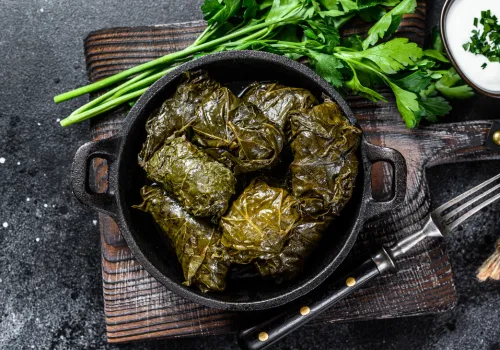
Dolma, or stuffed grape leaves, are a Mediterranean classic. While they’re often served as an appetizer, they make for a delicious and portable breakfast option too.
These little parcels are filled with rice, herbs, and sometimes ground meat (though vegetarian versions are common).
They’re tangy from the grape leaves and packed with flavor from the herbs and spices used in the filling.
Nutrition info: Five stuffed grape leaves provide about 150 calories, 3g protein, 8g fat, and 18g carbohydrates.
Fava Bean Dip (Ful Medames)
Ful medames is a hearty fava bean dip that’s a popular breakfast food in Egypt and other parts of the Middle East. It’s filling, nutritious, and packed with plant-based protein.
The fava beans are cooked until soft, then mashed and mixed with olive oil, lemon juice, and spices like cumin.
It’s often topped with chopped tomatoes, onions, and a drizzle of olive oil. Serve it with warm pita bread for dipping.
Nutrition info: A serving of ful medames (1 cup) contains approximately 250 calories, 13g protein, 8g fat, and 35g carbohydrates.
Fish
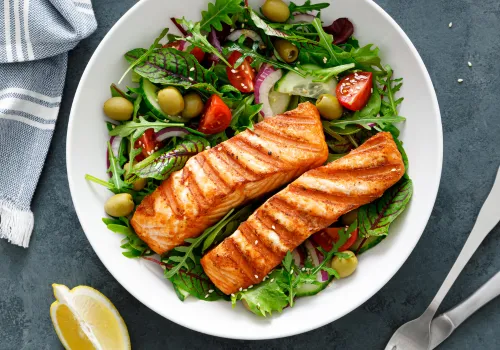
Smoked Salmon with Capers
Smoked salmon is a luxurious breakfast option that’s popular in many Mediterranean coastal areas.
It’s rich in omega-3 fatty acids and provides a good dose of protein to start your day.
Serve thin slices of smoked salmon on a bagel or toast, topped with cream cheese, capers, and thinly sliced red onion. A squeeze of lemon juice adds a bright, fresh flavor.
Nutrition info: A serving of smoked salmon (3 oz) with cream cheese (1 tbsp) and capers provides about 200 calories, 20g protein, 13g fat, and 3g carbohydrates.
Sardines on Toast
Sardines might not be the first thing you think of for breakfast, but they’re a nutritional powerhouse and a common morning meal in parts of the Mediterranean.
Mash sardines with a fork and spread on toast. Top with sliced tomatoes, a drizzle of olive oil, and a sprinkle of fresh herbs like parsley or dill.
It’s a savory, protein-rich breakfast that’ll keep you full for hours.
Nutrition info: A serving of sardines (3 oz) on toast (1 slice) with olive oil contains approximately 250 calories, 20g protein, 15g fat, and 15g carbohydrates.
Tuna Salad with Olives
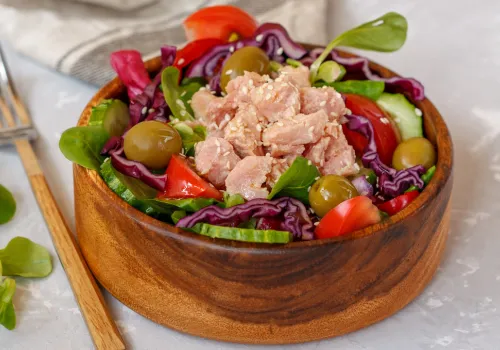
A light tuna salad can make for a refreshing and protein-packed breakfast. This Mediterranean version includes briny olives for an extra flavor boost.
Mix canned tuna with chopped olives, diced tomatoes, and a splash of lemon juice. Serve it on top of mixed greens or with whole grain crackers for a balanced meal.
Nutrition info: A serving of tuna salad with olives (1/2 cup) provides about 180 calories, 20g protein, 10g fat, and 5g carbohydrates.
Anchovies with Lemon and Herbs
Anchovies are a flavor-packed fish that are popular in many Mediterranean cuisines. While they might seem intense for breakfast, they’re actually a common morning food in countries like Spain and Italy.
Serve whole anchovies on toast, drizzled with olive oil and lemon juice, and topped with fresh herbs like parsley.
If whole anchovies are too strong, try an anchovy paste spread thinly on bread instead.
Nutrition info: A serving of anchovies (2 oz) with olive oil on toast provides approximately 200 calories, 20g protein, 12g fat, and 10g carbohydrates.
Fruits and Nuts
Fresh Fig Plate
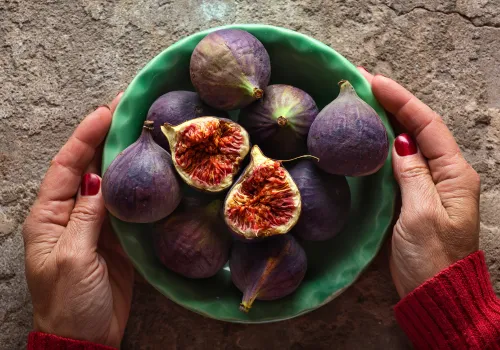
Figs are a quintessential Mediterranean fruit, and when they’re in season, they make for a delicious breakfast. Their natural sweetness pairs well with savory flavors too.
Arrange fresh figs on a plate with a dollop of Greek yogurt and a drizzle of honey. Sprinkle with chopped walnuts or pistachios for some crunch.
This simple plate is not only delicious but also visually stunning.
Nutrition info: A plate with 3 fresh figs, 1/4 cup Greek yogurt, 1 tsp honey, and 1 tbsp chopped nuts provides about 200 calories, 8g protein, 7g fat, and 30g carbohydrates.
Melon with Mint
Melon is a refreshing choice for a light summer breakfast. In many Mediterranean countries, it’s common to start the day with some fresh fruit.
Cut cantaloupe or honeydew melon into cubes or balls. Sprinkle with fresh mint leaves for a burst of flavor. If you want to make it more substantial, add a handful of pistachios or a dollop of Greek yogurt.
Nutrition info: 1 cup of melon with 1 tbsp chopped mint contains approximately 60 calories, 1g protein, 0g fat, and 14g carbohydrates.
Dried Fruit and Nut Mix
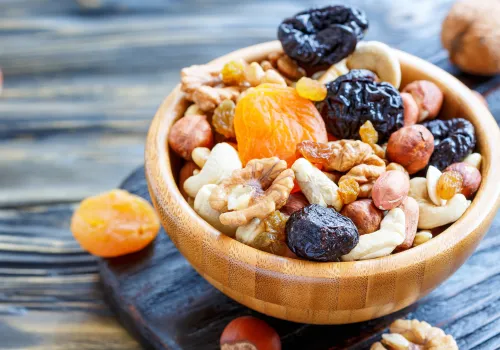
A mix of dried fruits and nuts is a convenient, portable breakfast option that’s popular throughout the Mediterranean. It’s also great for an energy boost later in the day.
Combine dried figs, apricots, and dates with almonds, walnuts, and pistachios. Add a sprinkle of cinnamon for extra flavor.
This mix is nutrient-dense and provides a good balance of carbs, protein, and healthy fats.
Nutrition info: A 1/4 cup serving of this mix provides about 150 calories, 4g protein, 9g fat, and 17g carbohydrates.
Pomegranate Seeds

Pomegranate seeds, or arils, are little jewels of nutrition. They’re packed with antioxidants and add a pop of color and tart-sweet flavor to your breakfast.
Sprinkle pomegranate seeds over Greek yogurt, add them to your morning oatmeal, or simply enjoy a bowl on their own. They’re a bit messy to eat, but well worth the effort!
Nutrition info: 1/2 cup of pomegranate seeds contains approximately 70 calories, 1g protein, 1g fat, and 16g carbohydrates.
Dates with Almond Butter
Dates are nature’s candy, and they’re a staple in many Middle Eastern cuisines. They’re sweet, chewy, and packed with fiber and minerals.
For a quick and satisfying breakfast, stuff pitted dates with almond butter.
The combination of natural sugars from the dates and protein and healthy fats from the almond butter will keep you energized all morning.
Nutrition info: 3 dates stuffed with 1 tbsp almond butter provides about 200 calories, 5g protein, 9g fat, and 30g carbohydrates.
Beverages
Turkish Coffee

Turkish coffee is more than just a beverage—it’s a cultural experience. This strong, unfiltered coffee is prepared in a special pot called a cezve and served in small cups.
The coffee is finely ground and boiled with water and sugar (if desired). It’s served with the grounds still in the cup, which settle at the bottom. Sip it slowly and enjoy the rich, intense flavor.
Nutrition info: A small cup (60ml) of Turkish coffee without sugar contains about 2 calories and 0g of fat, protein, and carbohydrates.
Mint Tea
Mint tea is a refreshing way to start your day, especially in North African countries like Morocco.
It’s light, caffeine-free, and has a cooling effect that’s perfect for warm mornings.
Steep fresh mint leaves in hot water for a few minutes. You can add a touch of honey if you like it sweet. The aroma alone is invigorating!
Nutrition info: A cup of mint tea without sweetener has virtually no calories or macronutrients.
Fresh Orange Juice

There’s nothing quite like a glass of freshly squeezed orange juice to brighten up your morning.
In Mediterranean countries, it’s common to see street vendors selling fresh juice.
While orange juice is high in natural sugars, it’s also packed with vitamin C and other nutrients. Enjoy in moderation as part of a balanced breakfast.
Nutrition info: A small glass (4 oz) of fresh orange juice contains about 55 calories, 1g protein, 0g fat, and 13g carbohydrates.
Ayran (Turkish Yogurt Drink)
Ayran is a savory yogurt drink that’s popular in Turkey and other parts of the Middle East. It’s refreshing, probiotic-rich, and a great way to stay hydrated.
To make ayran, blend plain yogurt with water and a pinch of salt. Some people add fresh mint for extra flavor. It’s particularly refreshing on hot summer mornings.
Nutrition info: A cup of ayran (8 oz) provides approximately 75 calories, 8g protein, 2g fat, and 7g carbohydrates.
Final Thoughts
Mediterranean breakfasts are all about fresh, wholesome ingredients and simple preparations that let the flavors shine.
Whether you prefer sweet or savory, there’s a Mediterranean breakfast idea here for everyone.
Remember, the key to a healthy Mediterranean diet is variety and moderation.
Mix and match these ideas to create your own perfect breakfast. Don’t be afraid to experiment with new flavors and ingredients!
